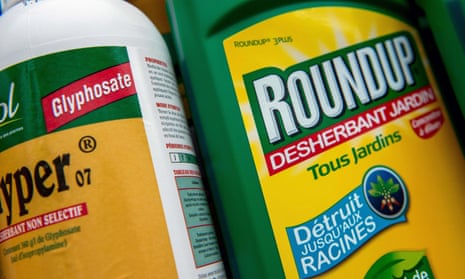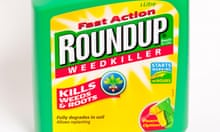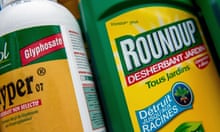The European commission has given a last-minute reprieve to glyphosate, the key ingredient in Monsanto’s bestselling Roundup weedkiller, just hours before it faced a recall from shops across the continent.
A row over the health risks posed by the substance has divided scientists, governments and international agencies, and led to the threat of lawsuits against the commission.
Glyphosate will now be given an 18-month extension until a new ruling on its safety is provided by the European Chemical Agency, by the end of 2017.
Heidi Chow, a campaigner with Global Justice Now, said the ruling “means another 18 months of hundreds of thousands of tons of a ‘probably carcinogenic’ chemical being sprayed on our parks, our farms and in our gardens”.
In a concession to the environmental campaign – which collected 2m signatures against relicensing the product – the commission announced new restrictions on its use in the interim.
Enrico Brivio, a commission spokesman, said: “These conditions include the ban of a co-formulant (tallowamine) from glyphosate-based products, obligations to reinforce scrutiny of pre-harvest uses of glyphosate as well as to minimise the use in specific areas such as public parks and playgrounds.”
However, these restrictions will not be binding on EU states.
Glyphosate is one of the world’s most widely used herbicides, with more than 6bn tonnes of the substance sprayed on farms, gardens and public spaces in the last decade.
It is also a perennial for the agro-industry group, accounting for just under a third of Monsanto’s earnings last year before interest and tax.
Increased weed resistance to the substance has coincided with ever greater use of it and tests consistently finding that a large majority of those surveyed now have traces of the substance in their blood streams.
However, the potential public health consequences are disputed, with one World Health Organisation study finding it “probably carcinogenic to humans” and another declaring it “unlikely to pose a carcinogenic risk”.
Seven EU states have extensive glyphosate prohibitions in place, two have restrictions and four countries have impending or potential bans, according to a “heat map” for the substance.
But representatives from the 27-country bloc as a whole proved repeatedly unable to reach the majority needed to either relicense glyphosate or ban it prompting the commission to step in with today’s technical extension to its authorisation.
Franziska Achterberg, Greenpeace’s EU food policy director, said: “This reckless decision was driven by a commission that has lost touch with European citizens, quietly backed by many national governments.”
Industry groups have complained that science was being sacrificed for political ends. A statement by Monsanto’s vice president for regulatory affairs, Phillip Miller, voiced “concern over the recent rise of narrowly focused politics of self interest, where national or partisan political imperatives take precedence over facts, scientific understanding and the interests of its citizens”.
Graeme Taylor, the public affairs director of the European Crop Protection Agency, said: “I’m sure many will paint this as some kind of victory for our industry, but frankly we are disappointed that after the European commission originally proposed a 15-year re-approval, we are now left with an 18-month extension, pending yet another assessment to add to the 90,000 pages and 3,500 studies of evidence that already exists.
Greens in the European parliament said that the decision showed “disdain” towards public opinion, after polls showing that two-thirds of European citizens favoured a ban.
The Green MEP Bart Staes said: “As perhaps the first EU decision after the UK referendum, it shows the commission is failing to learn the clear lesson that the EU needs to finally start listening to its citizens again.”









